#fear of miscegenation
Explore tagged Tumblr posts
Text









In Gunfighter Nation, cultural historian Richard Slotkin discusses the myth of the American frontier and the ways in which the “hunter-hero” traverses the wilderness outside the corrupt commercial centers and embodies a “regression to the primitive.” As beings that exist outside the vision of those whom Sam and Dean call “civilians,” the demonic Others that threaten humankind within the context of the show are simultaneously the primitives the Winchesters must battle and the living reflections of dark powers that lie within themselves…
The Road to Lordsburg: Rural Masculinity in Supernatural by Lorrie Palmer
#I have been spinning pearl and sam around in my brain nonstop since I watched duel in the sun a few days ago and this is the first coherent#thing I’ve done with these thoughts#pearl chavez#duel in the sun#sam winchester#supernatural#if it isn’t clear what I’m saying: sam being fed demon blood is literally about the fear of miscegenation
4 notes
·
View notes
Text
lovecraft also does this. but i don’t like him 🤭 so i will not put up with it
the problem with poe stories is that they're all written by the same fucker who couldn't use one word if ten would do, which is fine when it's one of his good stories where the excessive word use adds to the atmosphere and tension and unbearable when it's one of his bad ones where you need him to shut the fuck up. and because he's Like That, you're not gonna know if it's one of his good or bad stories until you've read way too much of it already
#do you know how fucking hard it is to be a weird grimdark teenager who cant get into lovecraft#he’s the origin of fucking Everything popular. or at least popular at the time.#everything’s eldritch everything’s lovecraftian everything’s squids from another dimension#i don’t like him! i like *some* of his works. but the vast majority are. im not reading all that!!!!!#i think. what do i like let me try and remember.#i liked the one about the monster who doesn’t realize it’s a monster until it sees itself.#i have a soft spot for… the fish people one? the one that’s very clearly lovecraft’s fears of miscegenation. which putting it like that#does make it worse but that’s just what everything he writes is like. but i do like the Vibes of that one.#and uhhhhh. i think there was maybe one more about a musician? that i remember liking? but that could’ve been someone else.#I Do Not Like Him.
34 notes
·
View notes
Text
Mary Shelley’s 1818 novel Frankenstein is not, of course, an example of the imperial gothic but instead a still relevant anti-Enlightenment fable. If a novel ever illustrated how the sleep of reason begets monsters, it is Shelley’s story of how a scientist’s urge to create artificial life leads to utter destruction. However, in Universal Studios’s 1931 Frankenstein, the many pertinent philosophical issues that the original gothic novel explores reshape into thinly veiled imperial gothic through the introduction of a eugenic and highly racialised discourse that changes the monster from a rightfully vengeful and eminently intelligent being into an atavistic criminal. In its Hollywood guise, the monster is not a tragic, lonesome and then understandably vengeful product of unethical science but instead a reincarnation of the degenerate criminal whose brain the monster is provided with in the film. This takes on a peculiarly American dynamics in the movie. As Elizabeth Young suggests in Black Frankenstein: The Making of an American Metaphor (2008), a connection between the monster and the supposedly primitive black American was made as early as during the immediate post-Civil War period when ‘the “hideous progeny” of Shelley’s novel was symbolically reborn in racist parody as the symbol of the miscegenated nation’. An important reference to American Reconstruction history is also the ending of the movie. Instead of escaping to the North Pole, as is the case in Shelley’s novel, the monster is exorcised by what amounts to a lynch mob. In Frankenstein the movie, as in the American South, justice is done by the people on the spot; by ‘lynch law’. The violation of the sanctified space and body of Frankenstein’s fiancée, Elizabeth, as much as the accidental drowning of the little girl, justifies this public rage in the eyes of the movie audience. This is the end that comes to those who dare violate the purity of white women, or oppose the progress of modernity in any form, be they black Americans in the South, Native Americans on the reservations or unruly natives in the Philippines. Like so many lynching victims, Frankenstein dies in flames. In this way, the discursive conditions that informed the British colonial enterprise as well as the racism that structured black and white relations in the US permeate Frankenstein. The childlike and aggressive monster is an example of the kind of human category that can never ‘possess the intelligence to make a rational choice of political allegiance’, as Lansing put it. In addition to this, the audience is also free to imagine an alternative narrative in which Fritz never drops the jar with the ‘normal’ brain to the floor. It is not science or faith in modernity that Frankenstein fears, it is atavism. The resolution to the crisis that atavism constitutes is the sad but necessary violence of the lynch mob. When the monster has been burned, the movie can end with the happy union of the film’s central white couple.
Johan Anders Höglund, The American Imperial Gothic: Popular Culture, Empire, Violence
429 notes
·
View notes
Note
Hi! I really like your other takes on Underdark races, and wanted to ask if you had any thoughts on improving grimlocks? Beyond the permanent blindness they have and the whole being humans who adapted to the underdark, there doesn't seem to be a whole lot else done with them.
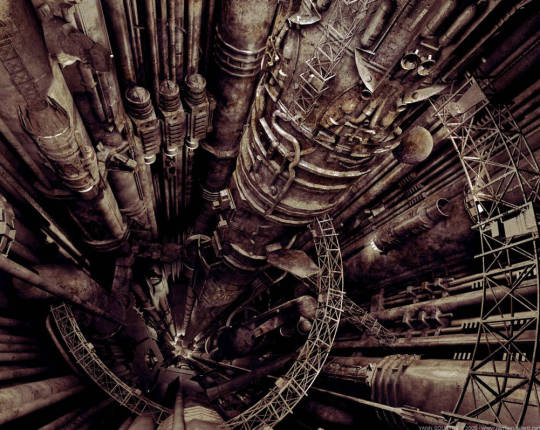
Monsters Reimagined: Grimlocks
Would it surprise anyone to learn that a d-list d&d monster has It's roots in 1800s ideas about eugenics and bad adaptations of genre fiction? No? Then you've been paying attention, top marks.
Asker is absolutely right in their assessment that there's not really much to grimlocks. They're one of many "hostile tribal primitives" that have filled out the monster roster ever since the original developers lifted them en mass from the pulp adventure stories they grew up reading.
A common theme among these pulp works and the early scifi that inspired it was devolution, the idea that a people could degrade from greatness back into an animistic nature. The most well known pop culture example would be HP lovecraft's deep ones, where the author's fears of race mixing manifest as monsters that literally push humanity back down the evolutionary ladder to the stage of fish.
There's plenty of different ways to explain the origin of this writing trend, but I like to chalk it up to an anxiety resulting from the widespread acceptance of Darwin's theory of evolution by a society that believed wholeheartedly in scientific racism. If intelligence (read: whiteness) wasn't just a god given right but was infact inheritable, then it could also be disinherited, bred out of a population whether by on purpose or by accident. This made it so important to practice good breeding (read: eugenics), to preserve the pure stock from falling to degeneracy (read: miscegenation) and introducing undesirable traits into the genepool.
We can see fear this with grimlocks, humanoids who were inherently lessened by their "adaptation" to life underground, losing their intelligence and eyesight and descending into a state of barbarism. Given that this is one of the few d&d monsters that mention evolution at all, we can trace this feature to their likely inspiration: The morlocks in H.G. Wells' Time machine, published a scant 36 years after Darwin published The Origin of Species.
I'm not well read enough to know whether Wells pioneered the idea of subhuman descendants, but I can say that most of his imitators missed the point of his writing: Wells saw in his day an increasingly indolent upper class inflicting brutal and dehumanizing labour conditions on the poor to support their own carefree lifestyle. He satirized this in his book by showing that while the descendants of the rich had devolved into beautiful, useless, idiots, the descendants of the workers devolved into subterranean ape-things who maintained the machinery that allowed the eden like existence of the rich while farming them for meat. Say what you will about Wells' race politics (Neither degenerate fop or inbred ape can withstand the smarts and strength of the enlightened colonial Englishman) but his writing was specifically class continuous, and the brutality of the morlocks was a direct result of the exploitation of working people in his own day and age.
When the morlocks were adapted into the grimlocks , the d&d writers kept their canibalistic streak but specifically removed their class based origins as well as their mechanical knowhow. This is a near identical process to what happened with a creature the worlocks helped inspire: Tolkien's orcs, which were likewise turned from a commentary on the brutality of the industrial age into warlike primitives. It's a bit of a trend.
If you wanted to "fix" the grimlocks I'd go one of two ways:
If you want to engage with themes of primality, make them legit underdark dwelling primates/australopithecus type of creatures, just figuring out tool use and language. Make the rumours of them being descended from cave-exploring humanoids a common myth made up by surface dwellers.
If you want to get spicy about it though, give them back their mechanical aptitude and maybe mix in a few more dashes of pulp "lost civilization" ancient aliens nonsense. Have them dwell in great mechanical complexes beneath the earth, worker drones who've long outlived the creatures that enslaved them and scribed mechanical knowledge into their very being. Originally denied understanding of the machines they toiled to build, work, and maintain, the grimlocks jealously guard the science they've spent generations reverse engineering, giving them the reputation of being violently territorial for those underdark travelers who venture too close to the megastructures they inhabit.
Artsource
#monsters reimagined#grimlocks#the orc dissertation#underdark#dnd#dungeons and dragons#d&d#ttprg#pathfinder
184 notes
·
View notes
Text
today's thoughts before passing out: the demon blood plot reading as a metaphoric fear of miscegenation, a result of classic Western tropes told through a Horror framework.
demon blood is a boundary crossing substance, invasive and transformative. Sam violated in the crib functions on one level as a rape metaphor, but its done so through demonic blood coming in to dilute his human blood. the violation then, comes in as a literal theft of identity. his body becomes the literal battleground between two forces - the domestic world of his family vs. the invading, monstrous outsider. Azazel snatches and preys on civilised children from the crib as a means of recruiting them to his tribe army, literally corrupting them on a bodily level, claiming them from their blood families as his own. and the more demon blood Sam drinks, the less 'human' he becomes (the less of his family's blood in him). Dean's anger over Ruby also ties into Sam's sexual relationship with her, of which the blood drinking is a component. the blood drinking is especially transgressive because it echoes deep-rooted settler colonial anxieties, expressed through the language of pop culture - fears over losing one's blood, family, and identity to a savage Other.

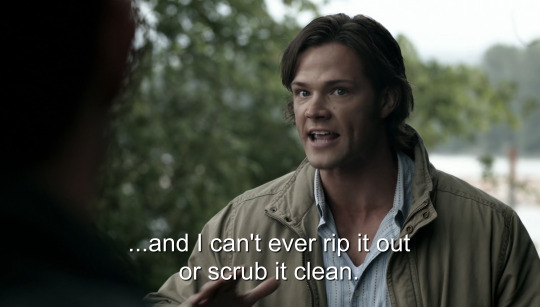
(4.04)

(4.21)
what got me started on this line of thinking was a recent rewatch of John Ford's The Searchers (1956), a movie so ingrained in the modern American cultural mythos that nearly every first year cinema studies course makes it required viewing lmao. it's a subversive Western, concerned with exploring the porous boundary dividing white settler communities from Native American communities, the defining line between the 'civilised'/'uncivilised', the colonial subject and the savage. it was released during an era when America was grappling with undoing laws around racial segregation, and reflects those anxieties through classic American mythology.
so. Sam is a modern interpretation of Martin and Debbie from that movie, and Dean is a modern variant on its leading anti-hero, Ethan Edwards (rather John is our initial Ethan figure, but we spend most of the show with Dean, who takes on his mantle). just to emphasise the connection between the show and this movie - Star Wars heavily references it, and Kripke's always been explicit about this show's two leads as Luke Skywalker and Han Solo. well, i'd argue this show definitely owes more to The Searchers than Star Wars does!
Martin is Ethan's adoptive nephew of partial Cherokee descent, made an outsider to his family, by his uncle, at the film's outset due to his blood. he joins his uncle on his revenge mission after a Comanche tribe destroys their home and steals his adoptive sister - Debbie. this mission becomes his coming-of-age journey into rugged frontier manhood, as much as it is his path towards integration into white, 'civilised' society.

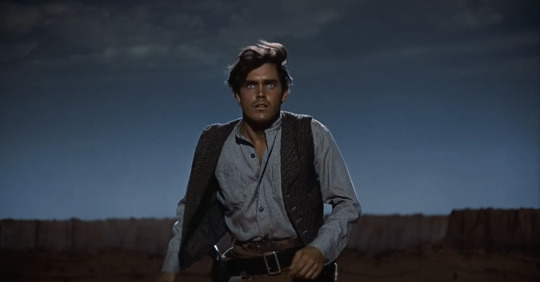
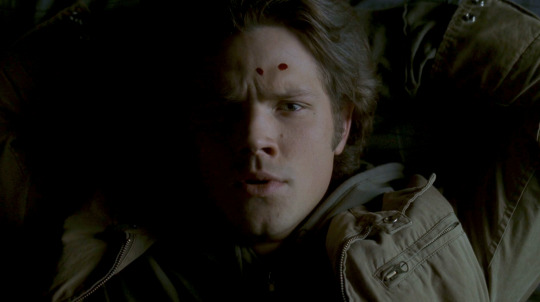

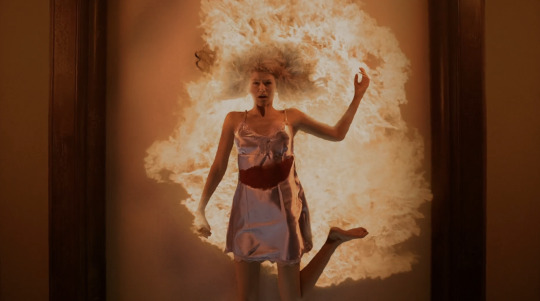
the protagonist of the film is Ethan, a soldier who gets consumed by his seven year long, bloody, vengeance-fuelled quest to recover his niece. when he finds Debbie, however, to his dismay he discovers she's no longer the 'pure' innocent he remembers. upon finding out that she's married to the tribe's chief - he literally disowns her as his blood kin, and at one point, even tries to kill her. Martin becomes the one to save her from his uncle's shot and the one to convince her to return home. he later convinces Ethan to recommit to rescuing her, and he ends up doing so.
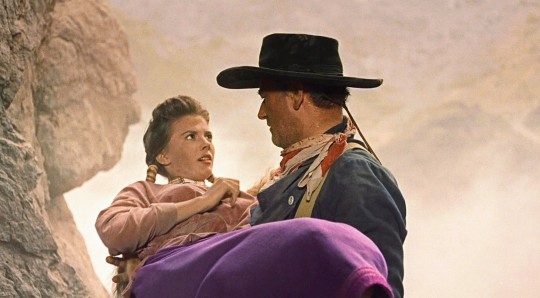



(15.17 - Sam over s4 functions as a Debbie figure, but Jack also takes up her role. Dean disowns him as Ethan disowns his niece)
over the movie, we see Ethan descend into ever increasing violence and 'wildness', grown closer to his enemy after years spent on the frontier, hunting them down. Martin gets to go home, his civilising mission completed as he marries into a white family. Ethan though, stands at the threshold in the iconic concluding shot below. he's been transformed by frontier violence to the point he no longer belongs to the domestic, civilised world. he wanders back out into the desert, alone.

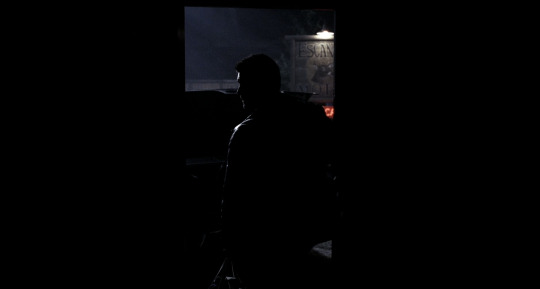
(1.14)
anyways. Supernatural owes so much of its dna to the classic Western, and to this movie in particular. what The Searchers was to collective white American anxieties over desegregation in the late 50s, this show was to collective white American anxieties over multiculturalism at the new millenium, in the wake of 9/11. Sam's demon blood is a critical defining line between him and his brother, as Martin's mixed race status is the defining line between him and his uncle. 'monstrosity' on this show metaphorically stands in for savagery; one brother gets thrown out onto the frontier, a journey towards 'taming' his own nature. and another brother drifts further and further away from civilised society the longer he spends fighting at the frontier, protecting civilisation from its monsters. 'blood don't end with family' comes to a screeching halt when it addresses the prospect of monstrosity. what is demon blood standing in for on this show? what does a monster represent, truly? who gets to step over the threshold into civilised society, and what is the price of that acceptance?
#spn#spn meta#incoherently kicking the hornet's nest!!! and now time to pass out#would love to see more analysis of the show through its references/tropes/archetypes tbh#all fifteen seasons of supernatural: john ford's the searchers (1956)#this show's brilliance lies in its marriage of cultural anxieties across genres -> classic westerns + modern (80s-90s) horror#“racism is the curse of the american soul”#my meta#supernatural is a modern western#j.txt
102 notes
·
View notes
Note
Been reading all of your psychosexual analysis of homestuck + it's characters and god this stuff is fascinating. It can be real hard to find any writing on sexuality, kinks and fetishes in fandoms but it seems that hs is almost like a gold mine when it comes to this topic thanks to the coming-of-age theme. The murder = sex post hasn't left my head since I read it and now when I see any scene mention / involve either of the two I can't help but think about how the other could be relevant. Never thought suicidal ideation could be so masturbatory before this.
Glad to say your posts have helped me get a slightly better understanding of anything I read. I'd never really thought much about things like positioning of characters in frames / panels, sequences of events and choice of words since I didn't really care for literary analysis before I got into homestuck. Sort of a 'came for the cool flashes, stayed for the writing' type situation, which is a pipeline that makes me thankful for the animations Hussie made because I'd only ever inferred that the writing was bad from conversations I'd seen people having about hs.
Anyway, you talked about how Rose's fear of drowning (loss of control) correlates to her non-con kink and now I'm wondering what you think the other characters fears suggest about their sexual interests? I'd assume John's fear of heights has something to do with the fall, and from there some sort of corruption kink / a fetish for anything generally 'sinful'; which would explain his interest in 'bad' girls like Vriska (and the way he eagerly adopts her mannerisms).
The planets tend to include each kid's fears / insecurities so it's not exactly hard to figure those out, but I'm not sure whether I'm making the "right" connections, since I'm just making the best with what I have (bare minimum literary knowledge) and homestuck makes a lot of references to outside works.
Extra request: if you've got any good books / posts / articles / whatevers on psychosexuality or such please tell me. I'm curious and bored
I'm glad you're getting something out of the blog! Goofy fetish talk is kind of rare, but it is striking when you find it: I watched Good Luck Chuck at Karkat's recommendation and that turned out to be a central motif. Sex/death substitution is a bit more common... here's a write up on Pulp Fiction you might like. You might also like these posts by SMG on Prometheus, he is the one who introduced me to a lot of the storytelling strategies I discuss on this blog. More generally though, I recommend looking for articles about movies you like and adding "psychoanalysis" to the search -- if nothing else, it's an easy way to find people who take sexual symbolism seriously.
Evaluating your own accuracy is tricky, but I can only recommend that you regard your current model of the story as provisional. Even as you search for information that strengthens your current understanding of the story, you'll likely stumble upon another framework that works just as well or better. Keep an open mind, some things have multiple answers
Re: fear-becomes-fetish motifs, the last major piece I wrote in this vein was about Dave, I think? It's kind of outdated though. My focus on individual psychologies faltered as I reoriented myself towards like, similar fear>fetish material on a societal level. One example: people inclined to worry about being Replaced by other races are the impetus for miscegenation porn, which repurposes feelings of resentment and inferiority for titillation -- this gets channeled into the "black always mates white" narrative of doom in Sburb, Derse (black) launching "seeds" at Prospit (white)/Skaia, Caliborn sexualizing his predomination over Calliope, etc. You can see traces of this narrative show up in characters like Kanaya (who agrees with Eridan that race purity matters, only to be haunted by cuck jokes like Watching Oblong Meat Products Tumble Into Places They Dont Belong) but its not like she even knows what black people are -- she's an alien. So when she tearfully agrees that Dirk can take better care of her wife than she ever could, it only /refers/ to the miscegenation porn structure, casting Kanaya as the impotent observer suffering yet another Lalondian "black out". There's a degree of abstraction at play that makes it difficult to say Kanaya "has" the kink being discussed through her, at least not in its entirety.
All of which is to say that while the kink angle is occasionally useful, it's not my current approach. Like you technically can link Jade's fear of lightning to her being a furry, but despite John explicitly referring to furry as a kink thing (and Jade having a daughter named Yiffy), the earliest reference to furry stuff is better parsed in terms of misogyny and transphobia, imo. You might be able to find more stuff indicating that Egbert secretly enjoys the Fall of Man (like her professed love of apocalypse movies, or the cheeky Save Rose From Corruption roleplay), but also the entry item could indicate a fixation on the Adam's Apple in the throat, as an early hint of June motifs. Or maybe I've just been away from this methodology for too long, and Egbert's traumatic fall from the slimer pogo indicates that the fear of heights should be linked to manbro bukkake theatre??? Idk, but again, that's not really my element anymore
#rambling#i mean it is my element in the sense that I think Hussie was committed to folding blades out of gay pornography#such that hidden gay shit is an end within itself#but that's not really the spirit of the ask#metameta
29 notes
·
View notes
Text
in that one 4chan greentext post going around satirizing the idea of america being the greatest country on earth (the one that starts with "pray to american flag for good fortune"), op cannot help but slip the fear of "my wife's boyfriend" into his dystopia (and later, people who dont speak english). even at his most aware, the white boy greentexter cannot mask his fixation on racialized cuckoldery. if anything, this state only further rationalizes his most irrational impulses. bosses, the military, hospitals and "my wife's boyfriend" are equally everpresent forces of subjugation, op's submissiveness and emasculation rendered evidence of this abuse. the reaction image accompanying the story is a man with tanned skin soyjaking in front of the american flag, a descendant in the lineage of /pol/ memes about how white americans arent really white people. at first glance, a ms paint drawing by a man seething about 'miscegenation', but with the added context, an inverted portrait of dorian grey. lovecraft ass microfiction
58 notes
·
View notes
Text

Racist print promoting anti-abolitionists' fears of multiracial personal relationships. Created by Edward Williams Clay in 1839. On December 13, 1893, Judge Householder of Knoxville, Tennessee, sent an entire family to jail on felony miscegenation charges. Setting bond at $500, he jailed a black man named Jim McFarland, and his mother, Ms. McFarland, a black woman, Henry Whitehead, a black man, Harriet Smith, who local authorities reported was a white woman, and her children from prior relationships with white men, Lydia Smith and John Smith. At the time of arrest, the multigenerational family lived in the same household. The court’s order left a young child at home without a caregiver. The family spent over a month in jail before facing trial in January. Newspapers noted that Smith had reported to them “with shameless candor,” that she was actually a black woman—while her mother was white, her father was a light-skinned black man—and that she had never pretended to be white. Local news speculated further that since Smith’s children had white fathers, those children living with black men and women might violate the miscegenation codes as written “even should the taint of negro blood be traced to the remote degree claimed.” Local media and the white Knoxville community praised Squire Householder’s actions, reporting that he “came to the rescue of the community” by “starting a war on the crime of miscegenation.” Ultimately, a month after her arrest, Smith was tried before a jury that determined she was “of colored stock,” and acquitted her and Henry Whitehead of miscegenation. However, the jury still convicted them both of lewdness for living together, and they were each sentenced to 11 months in the workhouse. The cases against her children were dropped by the prosecutor after this verdict.
x
189 notes
·
View notes
Text

Did you know that Cuba had a policy to "Whiten" the African population? This is a very deep article that deals with 5 Countries that deliberately brought Europeans into their country to lighten the complexion of the people in many cases. Many of us don't know this aspect of history.
"After the trans-Atlantic slave trade was officially abolished toward the end of the 19th century, many whites felt threatened and feared free Blacks would become a menacing element in society. The elites spent a great dealing of time mulling over how best to solve the so-called Negro problem. A popular solution that emerged during this period was the ideology of racial whitening or “whitening"."
"Supporters of the “whitening” ideology believed that if a “superior” white population was encouraged to mix with an “inferior” Black population, Blacks would advance culturally, genetically or even disappear totally, within several generations. Some also believed that an influx of immigrants from Europe would be necessary to successfully carry out the process."
Although both ideologies were driven by racism and white supremacy, whitening was in contrast to some countries that opted for segregation rather than miscegenation, ultimately outlawing the mixing of the races. This, however, was just a different means to the same end as these nations also imported more Europeans while slaughtering and oppressing the Black population.
SOURCE:
https://atlantablackstar.com/2014/03/10/5-black-nations-that-imported-europeans-to-whiten-the-population/
6 notes
·
View notes
Text

“Merle Oberon, the durable Anglo-Indian beauty born Estelle Merle O’Brien Thompson in Tasmania (1911), made her film debut as an extra in a 1930 British B film, but soon her dramatic if one-dimensional beauty caught the eye of the Hungarian-born British producer Alexander Korda, who groomed her for stardom and was her husband for a time. In 1935 he sold a half-share in her contract to Samuel Goldwyn, another famous star spotter, who oversaw her transition from exotic to all-American. Never a top star but a popular actress in a number of prestigious films, Oberon continued to make periodic starring appearances until her death.”
/ From Hollywood Colour Portraits by John Kobal, 1981 /
Born on this day: exquisite golden age Hollywood leading lady Merle Oberon (19 February 1911 - 23 November 1979). Of course, we now know that Oberon was actually born in Bombay, India rather than Tasmania, but that wasn’t common knowledge when film historian Kobal wrote his book in the early eighties. In her lifetime Oberon took painful efforts to conceal her mixed-race heritage (when even an onscreen interracial kiss – then called “miscegenation” - was strictly forbidden by the Hays Code), including the use of toxic skin-lightening make-up containing mercury. (A few years ago, the reliably excellent and addictive You Must Remember This podcast devoted an instalment to Oberon – look it up!). In her romantic lead heyday Oberon specialized in period dramas (she’s probably best remembered for playing Catherine Earnshaw in Wuthering Heights (1939)), but I like her best in the movies that forced her out of her primarily decorative and ladylike comfort zone like the sordid Temptation (1946), the nymphomania-themed melodrama Of Love and Desire (1963) and especially the obscure 1956 film noir The Price of Fear, in which she plays a prim high society woman whose life unravels after a hit-and-run incident.
#merle oberon#cecil beaton#you must remember this podcast#lobotomy room#you must remember this#biracial#old hollywood#classic hollywood#golden age hollywood#golden age of hollywood#leading lady
65 notes
·
View notes
Note
Considering all of the nods to Lovecraft, do you think the seat of House Codd on the Iron Islands would basically be a medieval Innsmouth?
Honestly, I always attributed the scorn that House Codd received to be the result of bigotry, since House Codd descends from thralls and salt wives. In that sense, it actually *is* a nod to Lovecraft, since his Deep One hybrids were rooted in his fear of miscegenation.
Thanks for the question, Anon.
SomethingLikeALawyer, Hand of the King
21 notes
·
View notes
Text
Redesign and Rewrite - Alastor
Alright, let's start this with my most disliked character of HH due to the design and non sense story.
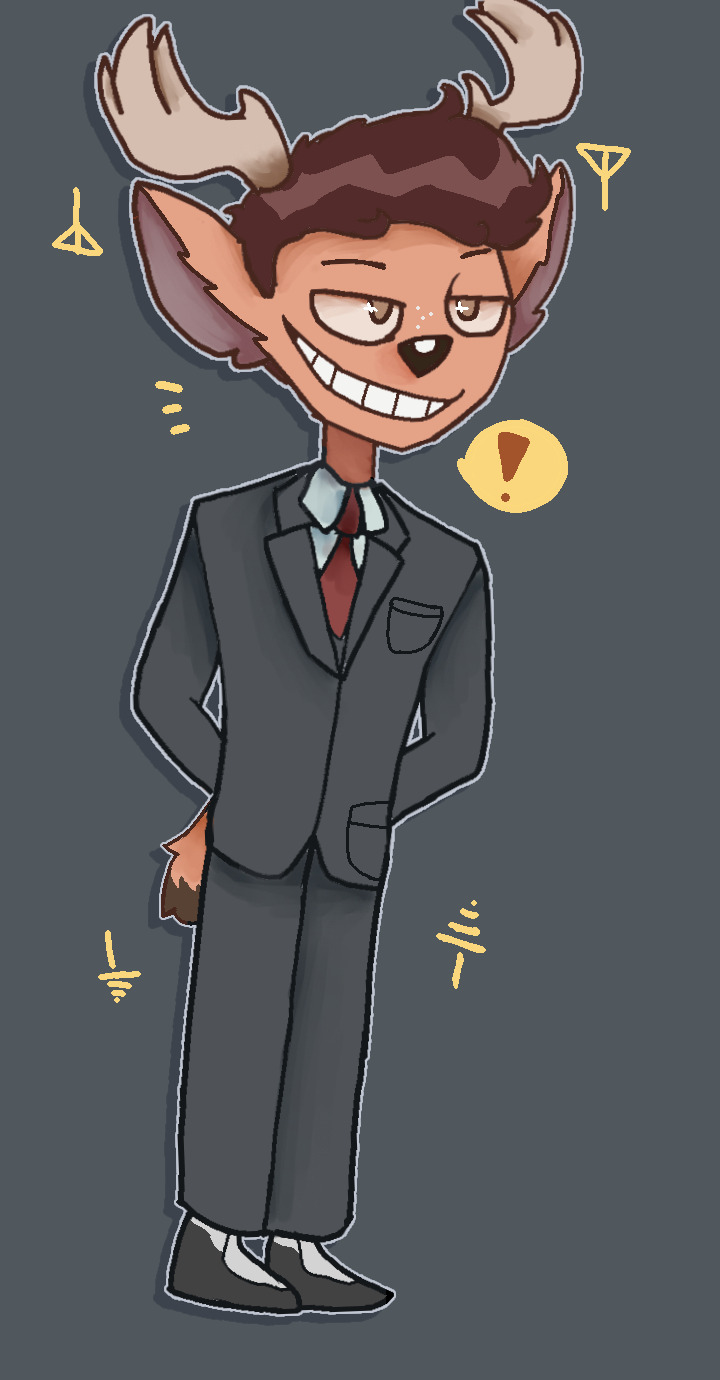
(Redesign, with Radio symbols.)
Alastor is born in the USA at the year 1891, in New Orleans, Louisiana. He wasn't born in the hospital like the others, and instead was born at home. This is because his parents committed the gravest crime in all of the United States (Miscegenation.)
His father is a rich merchant, and secretly works for violent ideological groups, of the conservative kind. He's short-tempered, insecure yet charming, and is pretty manipulative. He was VERY glad that his son didn't turn out "too" dark, or his son wouldn't even succeed in this political climate.
His mother was a poor farmer until she married the father. She's caring/compassionate, loving, and loves to give care to animals (she feeds stray cats when she goes outside) and also loves to cook.

(Alastor's mother. Young. With spoon and fork symbolism)
Unfortunately, though, His parents tend to fight a lot, With the father screaming and even hitting the mother. He also has hit his son. which leads the father to leave the family.
Alastor clings to his mother, scared to even go outside and meet people. His mom tries to calm him down with affection and teaches him how to cook. She prepares Alastor to go to school and goes there with his mom's friend. He's very quiet, which leads his classmates to see him as a sort of freak. Leading him to not make any friends.

(Alastor as a young boy, staring at the newly bought mirror.)
After Alastor became an adult, he got a job at a Radio station, yet it was far away from his home. His mom was very old and unable to take care of herself. He was worried and yet got reassured by his mom's friends that they will take care of her.
He made good money and a good reputation as a Radio Host in Louisiana and even got invited to a popular podcast in New York. Sadly though, he had to stop his work for months when his mother died.
Other than being a Radio Host, he was fascinated by crime and violence, which led him to actually commit murder. He wasn't guilty, instead used to body as something to eat. He liked the taste, which made him want to murder more people and get more "meat". The authorities were in high alert and tried to find the serial killer, yet with no success.
Alastor died in 1945 (aged 54) by being shot in the head by a deer hunter, after being attacked and bitten by dogs.
Fast forward to now, where he's the most feared overlord in Hell and "helping" Charlie with her Hotel, sometimes he wishes Charlie's idea works. Sure, he came here to burn the Hotel down in the end because "ENTERTAINMENT!" but... He wanted to be given a second chance, so he could maybe see his mother again, who's likely in Heaven.
----------------
That's the rewrite! I searched through the Web when writing this backstory, as I try to be accurate to old times, and the fact that I never lived in the USA so there's that.
I may do Angel Dust next, I don't know.
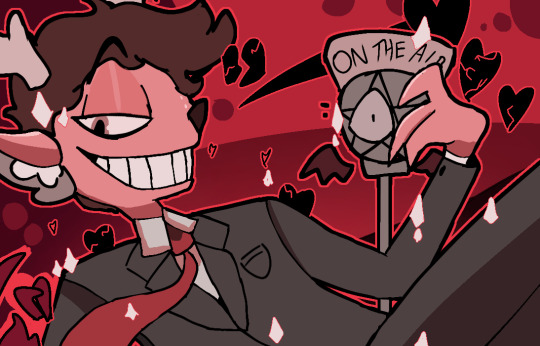
(Bonus Image: Valentine!)
#vivziepop critical#my art#digital art#hazbin hotel critical#spindlehorse critical#art#hazbin redesign#hazbin rewrite
25 notes
·
View notes
Note
elaborate on the faulkner miscogenation incest paper
oh man i mean. yeah its just whats in the book.



which just kind of illustrates (to me) the whole books theme of the southern racial experience and the fear of miscegenation that ensured the destruction of the old south and its demonic legacies (sutpen)
#this is actually a smaller part of the paper what im actually focusing on is specifically the white female fear of the black female body#vis a vis rosa coldfield and clytie#tw slur#tw n slur#this book is a difficult read
8 notes
·
View notes
Note
can i request your hot takes on why the warrior cat clans are bad? 👀
(to be clear this is an opinion i agree with, even though the writing team hilariously seems to think that the clans are totally great and fine)
Damn you caught me RIGHT before I was about to fall asleep but now I’m awake because I love to think about this and have little opportunity to yap about it.
Disclaimer I haven’t really read a wc book in years, I read them a LOT as a kid and it made a huge impression on me. It’s the fandom I’ve been in the longest and I’ll probably never leave like I fear wc amvs on YouTube irreversibly altered my brain chemistry in a serious way. So that’s where I’m coming from.
This all began when I tried to get back into actually reading warrior cats a few years ago. I started with the manga as a kid so I wanted to pick up the latest one, A Shadow in RiverClan. I’ve also always liked feathertail so it worked out.
Color me shocked when I read the most bold faced fascist apologia I have ever seen in my life. Like it’s SHOCKING as someone who hasn’t read the series since I was like 12 or 14 when I was dumber and less aware of this kind of stuff. I didn’t end up reading anymore wc until the new graphic novels started coming out because of how blatant it all was to me like I was REALLY turned off of the canon material for a while.
In aSiRC feathertail is basically a woman who was almost executed for being mixed race/nationality and the person who allowed this to happen is still in power. Her brother is able to reintegrate with their society but she can’t forget that everyone in her tight knit nation-state cult thing were going to passively allow her and her brother and their mentors to be murdered for their heritage. The moral of this story is to forgive the leader and get over it which! Is fuckin crazy!
But what else can the moral be? Warrior cats at its core is just fundamentally pro-border and lowk anti-miscegenation (lowk. LOWK) and the more you look at it the more insanely fashy it gets.
BloodClan is a bunch of urban gangsters from a foreign place who, despite being impoverished and explicitly allowed to be murdered by clan cats under the warrior code, pose a threat to the Clans and have to be vanquished, essentially.
It just very much gives anti-immigrant nationalist propaganda to me! So truly atp I don’t have any real interest in just like la di da isn’t it fun to be a clan cat stories or ocs or whatever it just makes me kind of uncomfortable! Not in a super serious way I just mean like, I do not get any enjoyment out of it anymore (other than highly headcanoned clangen blogs honestly, shout out splinterclan)
And I’ve never really engaged with the books themselves as much as I have the universe and sparse lore, so I find it way more interesting to really get into the whole Clans as cult idea.
Starclan is always being shady and manipulative and the scope of their powers is super unclear, the society itself values violence and separation both between the clans who really have no reason to be doing all that to each other and “outsiders”, there are all these draconian rules about who can and can’t have babies with whom, there’s an entire class of celibate mystics (who I love to hc as more celibate and more mystic than even in canon), there’s just so much crazy cult shit! Not even to mention the manifest destiny shit in tnp.
I also have been coming at it from a non-white/immigrant/mixed race lens and that’s almost how the very first arc is framed! From an outsider’s pov, and basically I have more fun with Rusty/Firepaw types being like wait! WTF have I gotten myself into!? Or a born clan cat breaking from the cult programming and realizing they would be better off away from this society.
If I keep going I’m just gonna be rambling about ocs so to cap this off, my summary of wc fascism barely scratches the surface of how bad it actually is and this is from a LURKER who doesn’t even read the newer sometimes even fashier books!! I know the series would never do this but I just can’t imagine my little kitty ocs running around happy in the war cult commune. Like, I can’t bring myself to just enjoy Clan structure anymore I have to abolish it. I have to!!!! Anyway. Goodnight!
#WOWZA THATS LONG#hope this is interesting to someone#wc#ask#ineffablebirds#forgive my conversation maria#ask answered
3 notes
·
View notes
Note
Do you have any thoughts on what's up with hussie obsession with combining established characters in the latter half of the comic? Davepeta, Jasprose, Lord English, all the rest of the alpha kid sprites? If that goes towards a discussion of Ultimate Selves, why is the most complete version of yourself someone who isnt even solely you anymore? Love your analysis!
Hello, welcome! Here's a couple approaches:
Sprites, like other alt-selves, can serve the elaboration of self-loathing: Characters want to be happy and are very scared that they are incapable of being happy. Seeing a version of themselves that achieved happiness by integrating another person can be a nightmare, seemingly confirming that misery is a defining feature of their existence. AR mocks Dirk in these terms, leveraging both his alleged supercomputer brain and his integration of Equius to make Dirk feel inferior, intrinsically lacking. Though in Vriska's case, the lack of modification on (Vriska) was also infuriating: their sameness meant that Vriska was not, as she likes to claim, the way she is entirely out of necessity. Alternate selves have a way of making people question themselves, mingled or no.
Sprites provoke an audience response: fans get angry when characters are diluted, be that through prototyping sprites or through "mischaracterization", flanderization, or other unpopular modes of personality change. Rose might call this protecting the brand. So you could allege, as the guys on HMTW occasionally do, that this gesture of defying brand integrity is calculated to raise reader engagement by corrupting a quality of the narrative that readers are invested in. It's a method of trolling.
It's a race-mixing joke: The word "miscegenation" (which replaced the earlier “amalgamation”) was originally coined in an ostensibly abolitionist pamphlet by pro-slavery agents. Their goal was to weaken the Lincoln election campaign by provoking a fear that gene-mixing was the explicit goal of the abolitionists, claiming in the pamphlet that race-mixing created a superior class of being. Insofar as Homestuck is a parody of racist rhetoric, the claim that the Ultimate Self (and the Ultimate Frog) is the product of the endless recombination of divergent selves seems downstream of this sort of sexualized racial fear-mongering -- Rose's ascension (ie her dilution) in the Epilogues plays into this by casting Kanaya as the impotent white cuck against Dirk's black stud: "Hes Going To Take Good Care Of Rose; Probably Much Better Than Id Ever Be Able To" is euphemism for sexual potency. (Cuck jokes have followed Kanaya since her early chatlogs: recall the phrase "Watching Oblong Meat Products Tumble Into Places They Dont Belong") Saturating the narrative with distraught reactions to more abstracted amalgamation serves the story's racial subtext
This isn't by any means exhaustive -- abstract fears of mixing and merging can also be applied to coitus, pregnancy, the blurring of masculine and feminine, etc. The narrative achieves its density and sense of abstraction by applying itself to multiple motifs at once, I tend to think. The different approaches can euphemize one another
21 notes
·
View notes
Text
On July 28, 1916, the chief of police in Louisville, Kentucky, announced the arrest of at least three people for interracial relations, or miscegenation. He also announced plans to open an investigation into the practice, which would “spare no effort” to prevent people from forming or maintaining interracial romantic relationships in Louisville.
Earlier that day, Louisville police made at least three arrests involving allegations of interracial romance. Authorities first arrested Harry Jenkins, a 34-year-old Black man, and Alice Shumaker, a 30-year-old woman who self-identified as Black but whom police believed to be white. Louisville law enforcement jailed both Mr. Jenkins and Ms. Shumaker on disorderly conduct charges, though they stood accused of little more than being found under the same roof together at the same time. Unwilling to accept Ms. Shumaker’s own racial self-identification, the local jailor forced her to submit to a blood test “to determine whether or not” she was Black.
The same white Louisville officers who arrested Mr. Jenkins and Ms. Shumaker also detained George Eaton, a 16-year-old Black boy. After subjecting George to a search, the officers found photographs of three teenaged white girls in his pocket. George claimed that the white girls had given him these photographs and refused to identify them. The officers arrested George, while the chief of police directed other high-ranking officials in his department to “make a round of photo galleries” in the city of Louisville to uncover the white girls’ identities.
Kentucky criminalized interracial marriages from the year it was admitted into the Union in 1792. At the time that Mr. Jenkins, Ms. Shumaker, and George were arrested, state law made it illegal for a Black person—defined by the Kentucky Supreme Court as a person with “one–fourth part or more of Negro blood”—to marry or live with a white person. Those found in violation of the law faced a fine of up to $5,000 and up to a year in jail. Black people charged with miscegenation faced dehumanizing treatment by law enforcement, and investigations and court proceedings were often humiliating and intrusive. Despite the fact that the Supreme Court invalidated all laws criminalizing interracial marriage in 1967, Kentucky did not repeal its anti-miscegenation statute until 1974.
During the Jim Crow era, one of the racial boundaries white people protected most fiercely was the prohibition on romantic contact between Black men and white women. Fear of intimate contact between Black men and white women was fueled by the pervasive myth that Black men were violent, sexually aggressive, and always in pursuit of white womanhood. In Kentucky and other states, these fears led to the aggressive enforcement of anti-miscegenation laws, the degradation of interracial couples, and the destruction of multiracial families. To learn more about anti-miscegenation laws and other policies enacted to maintain white supremacy, read EJI’s report, Segregation in America.
#history#white history#us history#am yisrael chai#black history#jumblr#democrats#republicans#Louisville#Kentucky#Harry Jenkins#Alice Shumaker#George Eaton#interracial marriage#segregation in america#end the apartheid#apartheid#israel#palestine#Segregation in America#Jim Crow#Kentucky Supreme Court#Supreme Court
6 notes
·
View notes